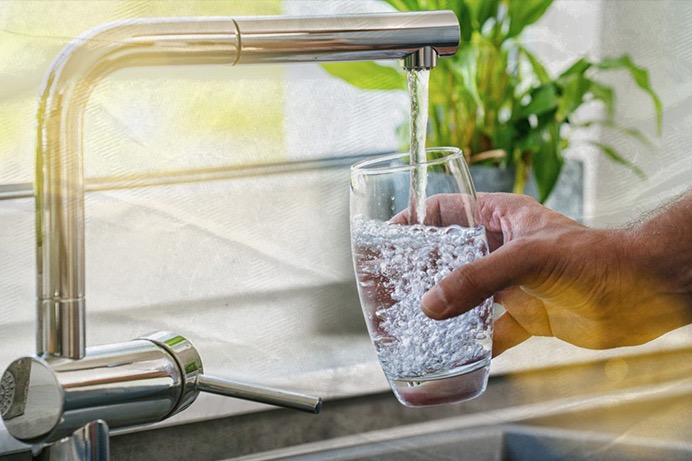You must drink water!

Water is ranked second only to oxygen as essential for life. There can be no life on earth without water. With 60 percent of our body weight is made up of water, you couldn’t survive for more than a few days without it. On the other hand, you can survive without food for weeks. Because our bodies lose water through breathing, sweating, and digestion, it's crucial to rehydrate and replace water by drinking fluids and eating foods that contain water. Our bodies use water in all the cells, organs, and tissues, to help regulate body temperature and maintain other bodily functions.
1. It regulates your body temperature
Staying hydrated is crucial to maintaining your body temperature. Your body loses water through sweat during physical activity and in hot environments. Your sweat keeps your body cool, but your body temperature will rise if you don’t replenish the water you lose.
2. It protects your tissues, spinal cord, and joints
Water consumption helps lubricate and cushion your joints, spinal cord, and tissues. This will help you enjoy physical activity and lessen discomfort caused by conditions like arthritis. Cartilage, found in joints and the disks of the spine, contains around 80 percent water. Long-term dehydration can reduce the joints’ shock-absorbing ability, leading to joint pain.
3. It helps excrete waste through perspiration, urination, and defecation
Your body uses water to sweat, urinate, and have bowel movements. You need enough water in your system to have healthy stool and avoid constipation. Your kidneys are also important for filtering out waste through urination. Adequate water intake helps your kidneys work more efficiently and helps to prevent kidney stones.
4. It helps maximize physical performance
Drinking plenty of water during physical activity is essential. Hydration also affects your strength, power, and endurance. It is essential that you drink water throughout intensive exercises. You need water to stay hydrated and maintain an adequate amount of fluid in your body.
5. It helps prevent constipation
Eating fiber isn’t the only way to prevent constipation. It’s also important to maintain your water intake so your bowel movements contain enough water
6. It aids in digestion and nutrient absorption
Drinking water before, during, and after a meal will help your body break down the food more easily. This will allow your body to more efficiently get the most out of your meals including those key nutrients, minerals, and vitamins your body needs, and will help you digest food more effectively
7. It helps you lose weight
Drinking water can make you burn more calories and can reduce appetite. Your body also requires water to be able to metabolize the carbohydrates and stored fat in your body. With less water in your body, you are less able to burn off excess fat as your metabolism isn’t as efficient.
8. It improves blood oxygen circulation
Blood is more than 90 percent water, and blood carries oxygen to different parts of the body. Water carries helpful nutrients and oxygen to your entire body. Reaching your daily water intake will improve your circulation and have a positive impact on your overall health.
9. It helps fight off illness
Drinking enough water can help prevent certain medical conditions, including: constipation, kidney stones, exercise-induced asthma, urinary tract infection, and hypertension.
10. It helps boost energy
Drinking water may activate your metabolism. A boost in metabolism has been associated with a positive impact on energy level.
11. It helps improve mood
Not getting enough water can also affect your mood. Dehydration may result in fatigue and confusion as well as anxiety.
12. Maintain mental energy levels
There is a strong correlation between your mental energy levels and how hydrated you are. Water helps transport oxygen and nutrients to the brain for optimal mental function. Even mild dehydration can reduce your mental energy levels significantly. Insufficient hydration can lead to decreased memory and cognitive performance.
13. It helps keep skin bright
Your skin is an organ and is made up of cells. And just like other organs, without water, it will not function properly or not at its best. With dehydration, the skin can become more vulnerable to skin disorders and premature wrinkling. Adequate water intake will help keep your skin hydrated and may promote collagen production.
14. It prevents overall dehydration
Dehydration is the result of your body not having enough water. And because water is imperative to so many bodily functions, dehydration can be very dangerous. Severe dehydration can result in a number of severe complications, including: swelling in your brain, kidney failure, seizures.
15. Drinking water aids with cognitive function.
Proper hydration is a key to staying in tip-top cognitive shape. Not drinking enough water can negatively impact your focus, alertness, and short-term memory.
16. Prevent headaches
One of the most common causes of headaches is dehydration. When you are dehydrated, the brain contracts temporarily due to fluid loss. This causes the brain to retract from the lining of the skull causing a headache.
Being attentive to the amount of water you drink each day is important for optimal health. General water intake (from all beverages and foods) that meet most people’s needs are: about 4 liters each day for men, about 3 liters daily for women. People get about 20 percent of their daily water intake from food. The rest is dependent on drinking water and water-based beverages. Thirst is usually an indicator that body fluids are well below required levels for optimal function. Drink water before you become thirsty or feel a dry mouth. Drink water often and stay healthy!
-If you have the following symptoms, you need to increase your daily water intake:
Excessive thirst, Dry mouth, Decreased urine output that is a darker yellow than normal, Dry skin, Headache, Sleepiness, Dizziness, Reduced ability to create tears.
Back to Articles



